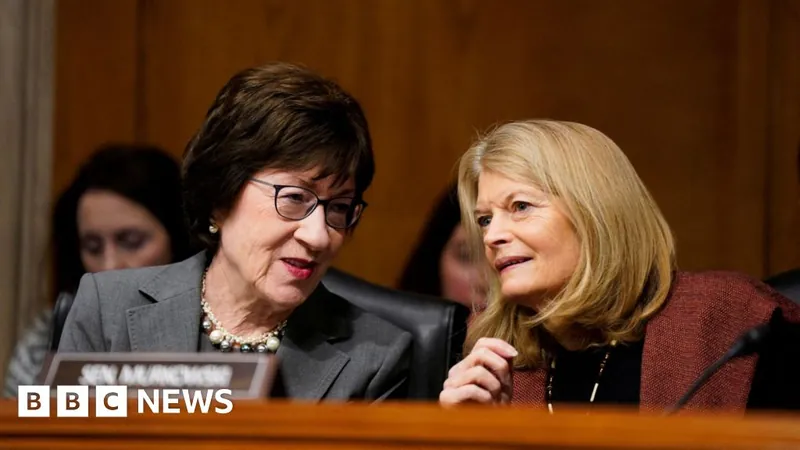
Republican Senators Join Forces with Democrats to Challenge Trump’s Canada Tariffs
2025-04-03
Author: Jacques
Republican Senators Defy Trump
In a surprising turn of events, four Republican senators have defied President Donald Trump by siding with Democrats to block his controversial tariffs on Canadian imports. In a vote that highlights growing dissent within the GOP ranks, Senators Lisa Murkowski, Mitch McConnell, Rand Paul, and Susan Collins cast their votes in favor of a resolution to terminate Trump's emergency declaration concerning fentanyl trafficking, which has been used as a justification for imposing tariffs.
The Vote
The resolution passed narrowly with a vote of 51 to 48. McConnell, the former Senate Majority Leader who has long expressed skepticism about Trump's approach, voiced his concerns, stating, "As I have always warned, tariffs are bad policy, and trade wars with our partners hurt working people most." His comments reflect a broader fear among some Republicans that Trump's hardline trade policies could undermine the economy.
Symbolic Opposition
Interestingly, despite the vote's significance, it appears largely symbolic—facing a Republican-controlled House of Representatives, the resolution is unlikely to gain traction. Yet, the dissenting Republicans' actions signal a potential rift within the party regarding trade policies.
Concerns Over Tariffs
Senator Tim Kaine of Virginia, who spearheaded the resolution, pointed out the real issue at hand, emphasizing that the tariffs, including a hefty 25% levy on steel and aluminum, are fundamentally a national tax burden on American families rather than a solution to the fentanyl emergency. "It's about tariffs. It's about a national sales tax on American families," he asserted following the vote on Wednesday.
Supporting Free Trade
Senator Rand Paul, who co-sponsored the legislation, reiterated the damaging economic effects of tariffs during an interview with Fox News, stating, "We are richer because of trade with Canada, and so is Canada." His remarks highlight a growing consensus among some economists that free trade agreements benefit both nations involved.
Trump's Reaction
In response to the bipartisan rebellion, Trump took to his social media platform, Truth Social, to label the dissenting senators as "extremely difficult to deal with and unbelievably disloyal." His reaction underscores the tension between the Republican leader and members of his party who are beginning to take a stand against his policies.
Democratic Support
The Democrats unanimously supported the resolution, emphasizing that the ongoing tariffs, which they argue primarily serve to fund proposed tax cuts for the wealthy, will only lead to higher prices for American consumers.
Future Concerns
While Trump unveiled a new wave of tariffs on other imports, Canada was notably excluded from this latest round, though it continues to face existing punitive measures. As a result, concerns grow that the administration is prioritizing its trade war over the economic well-being of American families.
Looking Ahead
This political maneuvering has heightened the scrutiny over Trump's trade policies, especially as new tariffs targeting foreign-made cars loom and could impose severe repercussions on Canadian imports. The ongoing saga raises questions about the future of U.S.-Canada trade relations and the ideological integrity of the Republican Party itself.









 Brasil (PT)
Brasil (PT)
 Canada (EN)
Canada (EN)
 Chile (ES)
Chile (ES)
 Česko (CS)
Česko (CS)
 대한민국 (KO)
대한민국 (KO)
 España (ES)
España (ES)
 France (FR)
France (FR)
 Hong Kong (EN)
Hong Kong (EN)
 Italia (IT)
Italia (IT)
 日本 (JA)
日本 (JA)
 Magyarország (HU)
Magyarország (HU)
 Norge (NO)
Norge (NO)
 Polska (PL)
Polska (PL)
 Schweiz (DE)
Schweiz (DE)
 Singapore (EN)
Singapore (EN)
 Sverige (SV)
Sverige (SV)
 Suomi (FI)
Suomi (FI)
 Türkiye (TR)
Türkiye (TR)
 الإمارات العربية المتحدة (AR)
الإمارات العربية المتحدة (AR)